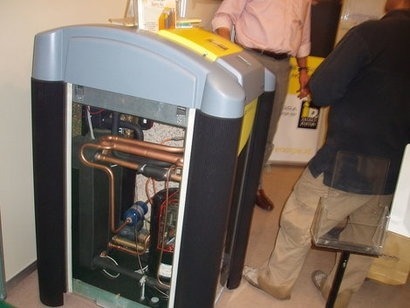
The UK Minister of State for Energy and Intellectual Property, Baroness Neville-Rolfe, has made an important speech during which she underlined the importance of heat pumps in tackling the challenge of heating buildings in the UK low carbon economy.
She touched on heat networks, heat storage and heat recovery – all of which are uniquely well suited to promote ground source heat pump deployment at a large scale. To support this, she also announced the launch of several key consultations and the long-awaited publication of the reforms to the Renewable Heat Incentive (RHI) an incentive payment scheme for consumers and businesses installing low carbon heating.
Baroness Neville-Rolfe pointed out that there are important economic opportunities for UK companies from the global move to a lower carbon economy.
“In 2014 the UK energy efficiency and low carbon heat sectors had a total turnover of £22 billion and exported £624 million of goods and services” she said. “This is a growing market - in services, in construction contracts and in high value manufacturing and tech.”
However, heat is one of the more difficult energy uses to decarbonise, and the Baroness pointed out that there is no consensus on the best technology or mix of technologies to achieve the scale of change needed over the long-term. This means that the UK has to be clear on what the challenge is, what can be achieved now and what should be the long-term direction of the policy. Neville-Rolfe explained that an important area of potential is creating a smarter energy system, with smart meters to all domestic consumers. Energy storage is another important area that can make a crucial contribution to heat decarbonisation.
With regard to heat pumps, Baroness Neville-Rolfe said that they are already being used in some UK homes and that 80 percent of owners that have a heat pump installed under the Renewable Heat Incentive are very satisfied with the technology. Unfortunately though, many consumers put off by the high upfront costs compared to a gas or oil boiler. It might be possible for costs to come down, as has happened with many other technologies, but the UK is also well-placed to take advantage of the technology with its relatively mild climate compared to more northerly latitudes. Consequently, the Government is launching improvements to the Renewable Heat Incentive scheme in order to encourage households and businesses to install electric heat pumps and also biomass boilers, instead of conventional fossil fuel systems.
The speech was broadly welcomed by the Ground Source Heat Pumps Association (GSHPA), given that the reforms will make some small but significant changes to ensure all types of buildings can benefit from public funding, including a modest rise in the Domestic RHI tariff.
This means that the proven and highly successful retrofit of Ground Source Heat Pumps (GSHPs) into tenanted housing using micro district heating systems featuring shared ground loops will become more easily financed as the payments are deemed rather than metered – and the tariffs can be guaranteed at date of order for projects over 100kW even if the commissioning date is some way into the future.
This focus on the unable-to-pay will make winters more comfortable and less worrisome for large numbers of the growing elderly community. However, the GSHPA has expressed some concern over the capping of payments for larger domestic systems which has been an area of strong deployment under the RHI to this point. The GSHPA will be keeping a keen eye on the effect this has on the market place and will be engaging with BEIS moving into 2017.
Large commercial GSHP projects, including new buildings and new housing with shared ground loops, will also benefit from a guaranteed tariff and the certainty that the RHI is fully funded until Spring 2021.
The GSHPA has participated in a detailed engagement with BEIS on this issue over the course of 2016. Almost seven years after Government's first RHI Consultation, the scheme now represents a solid platform that can be used to develop the future policy framework. This will further encourage GSHPA members to deliver the aggressive but sustainable growth in GSHP markets over the next decade that will be essential to help the UK meet its legally binding energy security, fuel affordability and emissions reduction targets.
For additional information:
Baroness Neville-Rolfe, Department of Business, Energy and Industrial Strategy (BEIS)

